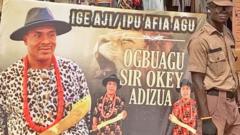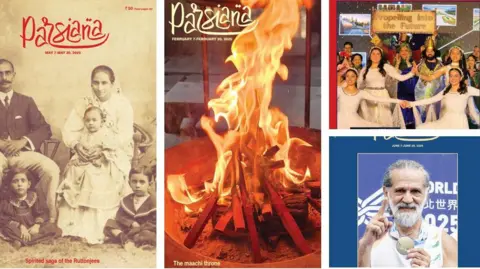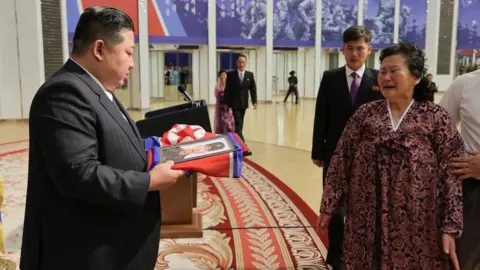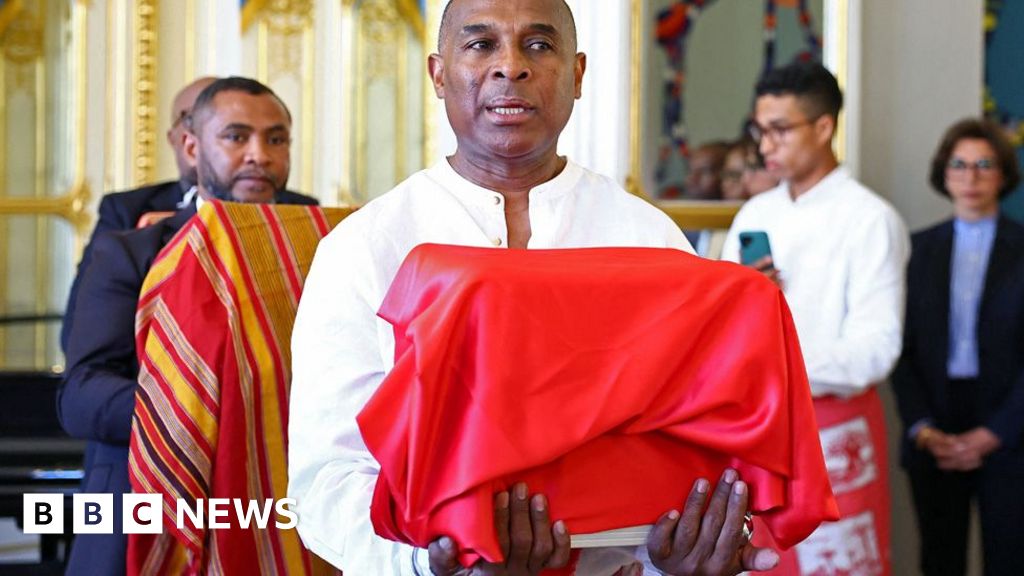The picturesque town of Oguta in southeastern Nigeria has recently seen a resurgence in the ceremonial pursuit of a rare honor: the title of "Leopard Slayer," or "Ogbuagu." The latest round of ceremonies has drawn crowds eager to witness the traditions steeped in history and prestige. At the age of 60, Ken Okoroafor, a businessman and healthcare professional, realized a lifelong aspiration by obtaining this esteemed title. The rituals associated with becoming an Ogbuagu echo the intense bravery and societal respect that were once attributed to the act of hunting a leopard—a significant cultural feat.
In yesteryear, slaying a leopard involved not just courage but also a communal celebration, where the meat was shared among 25 villages. However, with leopards becoming endangered, conservation efforts have transformed the practice into a monetary offering. Now, aspiring members present a substantial financial contribution to their community instead of presenting a leopard.
While the tradition has evolved, the essence of respect and community ties remains strong. Okoroafor noted that joining the Igbuu Society—of which there are about 75 members—offers social status and influence within the town, a motivating factor for many. The ceremonial lineage for becoming an Ogbuagu is intricate, involving multiple stages, from reenacting the hunt to a final grand feast.
In December, the ceremonies drew hundreds as aspiring members like Zubby Ndupu began their journeys as Leopard Slayers. Guests mingled amidst traditional food and ceremonial rites, as the Eze Igwe—a revered local king—sent his representative to observe the proceedings. The multi-stage initiation includes spiritual rites at home, where sacred items are bestowed upon the initiate.
The societal implications of holding an Ogbuagu title are significant; members enjoy leadership roles in community decisions and participate in cultural events without the usual protocols of bowing to the king. Furthermore, their distinctive ceremonial attire and bracelets mark their status in grand celebrations like weddings.
Despite the robust tradition associated with the title, there are criticisms regarding its exclusivity and expenses. The society's selection criteria can bar descendants of slaves, prompting calls for reform. Advocates argue for a more unified community that reflects contemporary values.
Still, members defend the society’s contributions, asserting that the ceremonies foster local economic growth and emphasize achievement. With a global membership base, primarily comprising diaspora individuals, the Igbuu Society links modernity with traditional customs. The rich cultural significance of the title of Ogbuagu serves as a reminder of Oguta’s vibrant heritage, appealing to those who wish to celebrate their roots.
For many, such ceremonies represent not only a cultural connection but also a personal pilgrimage returning to one’s identity. As Okoroafor reflects on his journey, he expresses eagerness to engage with his hometown’s traditions more actively now that he’s an Ogbuagu, resonating with a pride that echoes through the community’s ties to the past and present.
In yesteryear, slaying a leopard involved not just courage but also a communal celebration, where the meat was shared among 25 villages. However, with leopards becoming endangered, conservation efforts have transformed the practice into a monetary offering. Now, aspiring members present a substantial financial contribution to their community instead of presenting a leopard.
While the tradition has evolved, the essence of respect and community ties remains strong. Okoroafor noted that joining the Igbuu Society—of which there are about 75 members—offers social status and influence within the town, a motivating factor for many. The ceremonial lineage for becoming an Ogbuagu is intricate, involving multiple stages, from reenacting the hunt to a final grand feast.
In December, the ceremonies drew hundreds as aspiring members like Zubby Ndupu began their journeys as Leopard Slayers. Guests mingled amidst traditional food and ceremonial rites, as the Eze Igwe—a revered local king—sent his representative to observe the proceedings. The multi-stage initiation includes spiritual rites at home, where sacred items are bestowed upon the initiate.
The societal implications of holding an Ogbuagu title are significant; members enjoy leadership roles in community decisions and participate in cultural events without the usual protocols of bowing to the king. Furthermore, their distinctive ceremonial attire and bracelets mark their status in grand celebrations like weddings.
Despite the robust tradition associated with the title, there are criticisms regarding its exclusivity and expenses. The society's selection criteria can bar descendants of slaves, prompting calls for reform. Advocates argue for a more unified community that reflects contemporary values.
Still, members defend the society’s contributions, asserting that the ceremonies foster local economic growth and emphasize achievement. With a global membership base, primarily comprising diaspora individuals, the Igbuu Society links modernity with traditional customs. The rich cultural significance of the title of Ogbuagu serves as a reminder of Oguta’s vibrant heritage, appealing to those who wish to celebrate their roots.
For many, such ceremonies represent not only a cultural connection but also a personal pilgrimage returning to one’s identity. As Okoroafor reflects on his journey, he expresses eagerness to engage with his hometown’s traditions more actively now that he’s an Ogbuagu, resonating with a pride that echoes through the community’s ties to the past and present.



















